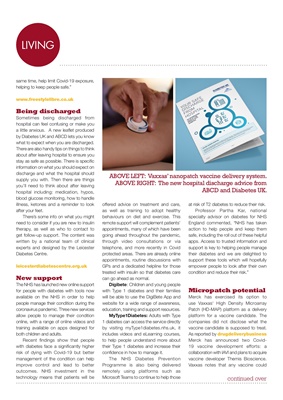
LIVINGLIVING
same time, help limit Covid-19 exposure,
helping to keep people safe."
www.freestylelibre.co.uk
Being discharged
Sometimes being discharged from
hospital can feel confusing or make you
a little anxious. A new leaflet produced
by Diabetes UK and ABCD lets you know
what to expect when you are discharged.
There are also handy tips on things to think
about after leaving hospital to ensure you
stay as safe as possible. There is specific
information on what you should expect on
discharge and what the hospital should
supply you with. Then there are things
you'll need to think about after leaving
hospital including: medication, hypos,
blood glucose monitoring, how to handle
illness, ketones and a reminder to look
after your feet.
There's some info on what you might
need to consider if you are new to insulin
therapy, as well as who to contact to
get follow-up support. The content was
written by a national team of clinical
experts and designed by the Leicester
Diabetes Centre.
leicesterdiabetescentre.org.uk
New support
The NHS has launched new online support
for people with diabetes with tools now
available on the NHS in order to help
people manage their condition during the
coronavirus pandemic. Three new services
allow people to manage their condition
online, with a range of online videos and
training available on apps designed for
both children and adults.
Recent findings show that people
with diabetes face a significantly higher
risk of dying with Covid-19 but better
management of the condition can help
improve control and lead to better
outcomes. NHS investment in the
technology means that patients will be
offered advice on treatment and care,
as well as training to adopt healthy
behaviours on diet and exercise. This
remote support will complement patients'
appointments, many of which have been
going ahead throughout the pandemic,
through video consultations or via
telephone, and more recently in Covid
protected areas. There are already online
appointments, routine discussions with
GPs and a dedicated helpline for those
treated with insulin so that diabetes care
can go ahead as normal.
Digibete: Children and young people
with Type 1 diabetes and their families
will be able to use the DigiBete App and
website for a wide range of awareness,
education, training and support resources.
MyType1Diabetes: Adults with Type
1 diabetes can access the service directly
by visiting myType1diabetes.nhs.uk, it
includes videos and eLearning courses,
to help people understand more about
their Type 1 diabetes and increase their
confidence in how to manage it.
The NHS Diabetes Prevention
Programme is also being delivered
remotely using platforms such as
Microsoft Teams to continue to help those
at risk of T2 diabetes to reduce their risk.
Professor Partha Kar, national
specialty advisor on diabetes for NHS
England commented, "NHS has taken
action to help people and keep them
safe, including the roll out of these helpful
apps. Access to trusted information and
support is key to helping people manage
their diabetes and we are delighted to
support these tools which will hopefully
empower people to look after their own
condition and reduce their risk."
Micropatch potential
Merck has exercised its option to
use Vaxxas' High Density Microarray
Patch (HD-MAP) platform as a delivery
platform for a vaccine candidate. The
companies did not disclose what the
vaccine candidate is supposed to treat.
As reported by drugdeliverybusiness
Merck has announced two Covid19 vaccine development efforts:
a
collaboration with IAVI and plans to acquire
vaccine developer Themis Bioscience.
Vaxxas notes that any vaccine could
continued over
ABOVE LEFT: Vaxxas' nanopatch vaccine delivery system.
ABOVE RIGHT: The new hospital discharge advice from
ABCD and Diabetes UK.